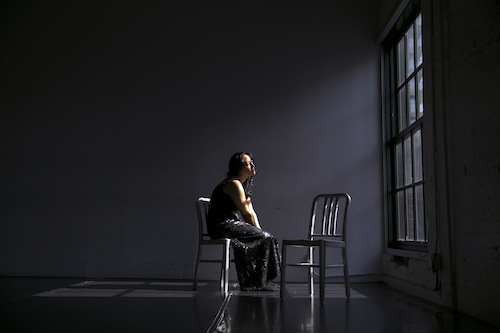 Bearing is an eye-opening opera about residential schools, part of the 2017 Toronto Luminato Festival
Bearing is an eye-opening opera about residential schools, part of the 2017 Toronto Luminato Festival
The hero quote on the Luminato page for Michael Greyeyes and Yvette Nolan’s Bearing is Michael Greyeyes searing comment: “Every person in Canada is surviving residential schools, because if you’re Canadian you’re part of it.” My relation to residential schools is not personal – there are no residential school survivors in my family – but the need to learn about them, and to engage in reconciliation comes through ethical and treaty obligations. I am a treaty person, because I live on land that was part of the Toronto Purchase.* With this in mind, I went to see Bearing expecting to be implicated, to learn, and be moved. I did not have the experience I expected.
Bearing is an opera told in three acts. The space feels imposing and significant, and there are clearly a great many talented performers in the production, but the repeated, seemingly endless taking on and off of grey and black clothes, interspersed with the meticulous folding of them, did not stir me. I sat puzzled and wary, mostly waiting.
Adding to that experience, the first act is sung entirely in German. I wondered if this was intended to feel and sound as foreign and bewildering as French or English would have to Indigenous children incarcerated in residential schools – no translation, no explanation. Perhaps Johann Sebastian Bach’s Jesu meine Freude (Jesus my Joy) was chosen as residential schools were also geared to a Christian G-d. To this music, three dressed dancers sit in chairs, and others stumble about, either in their underwear, or in the clothes they encounter on the stage. There is a lot of taking clothes on and off, and a lot of folding. Sometimes the Indigenous dancers give the non-Indigenous dancers clothes, which looks like the Indigenous people are giving the others roles.
At the end of the first act, there is a single and quite stirring moment of implication. The three dressed Indigenous dancers move out to the three banks of the audience, survey us, and then take seats among us. For the second act, they too will watch, no longer engaged on the stage, but as audience or observers. It’s powerful to consider who is subject and who is object, which of us is an actor, who is observed, and whose gaze is being met.
The program describes the second act as taking place within the classroom of a residential school. The program’s sparse three paragraph description is essential for audience members who want a sense of narrative. While I was not always able to relate the description to what happened on stage, without the program I would have been lost. The music of the second act is Wo bist du Licht! (Light, where are you?), perhaps to echo the desperate sounds of those incarcerated in the school.
The third act is shaped by mezzo soprano Marion Newman (Kwagiulth and Stó:lo) who addresses the audience directly, asking “whose light are you seeking, whose light are you taking” reminding us via Mathew, 25 that “that you do to the least of these my brothers you do unto me” and reminding us that we all have a legacy still to create, either towards reconciliation, or further into the project of colonization.
Both Michael Greyeyes and Yvette Nolan have parents who are survivors of residential schools, and I wonder whether part of the muted storytelling of Bearing is an attempt to not make their parents’ pain entertainment for settlers. I was prepared to be disturbed or even distressed by this show and came away feeling mostly as though I had endured. I can make a metaphor there for a facet of the residential school experience: impenetrable, relying on confusing cues, a stark unfamiliarity with no comfort in sight. I am willing to believe that there are stories I can not see, shows created with other people in mind, and perhaps this is one of them. I value that this was a story created by Indigenous people, and that it is Indigenous art set in the present day, not limited by a settler’s imagination of tradition. Perhaps, specifically and intentionally, Bearing is not for me to be satisfied by.
Details
Bearing played June 22-24 2017 at the Canadian Opera Company complex on Front Street as part of the 2017 Luminato Festival
photo of Marian Newman by Liz Beddall
*The Anishinaabe, the Mississaugas and the Haudenosaunee bound themselves to share the territory and protect the land with the ‘Dish With One Spoon Wampum‘. The original nations have invited subsequent Indigenous Nations and peoples, Europeans and all newcomers into this treaty in the spirit of peace, friendship and respect – I recognize The Dish With One Spoon Wampum as part of a commitment to honouring indigenous government and governance.
